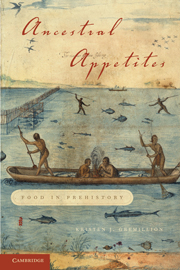4 - Farmers
Published online by Cambridge University Press: 05 June 2012
Summary
Why should we plant, when there are so many mongongo nuts in the world?
!Kung informant, quoted by Richard Lee in “What hunters do for a living, or how to make out on scarce resources” in Man the Hunter.Curiously primitive stone tools of Ice Age provenience came to light with increasing frequency during the nineteenth century, giving rise to speculations about ancient people who lived as hunters. It seemed logical to attribute their neglect of agriculture to ignorance or some inherent deficit, because the benefits of farming seemed obvious. Instead of living hand to mouth, an agricultural people could produce surplus food and amass wealth with which to enjoy the refined pleasures of learning and the arts and to develop civilized forms of government. Savage society could only aspire to reach these heights by undergoing progressive evolution to a more advanced state, one prepared to invent or accept the agricultural way of life.
Modern ethnography cast doubt on the inevitability of agriculture and animal husbandry, especially when the prevailing image of hunter–gatherer life flipped from hand-to-mouth desperation under harsh conditions to a more realistic, if sometimes romanticized, vision of limited labor and abundant leisure time free from drudgery. With this shift in perspective, the adoption of agriculture and animal husbandry demanded explanation. Instead of seeming mysterious, the failure to make the transition to agriculture looked more like an understandable reluctance to leave behind the relatively stress-free, peaceful, and nutritionally sound lifestyle of the hunter–gatherer band.
- Type
- Chapter
- Information
- Ancestral AppetitesFood in Prehistory, pp. 48 - 70Publisher: Cambridge University PressPrint publication year: 2011
- 1
- Cited by

